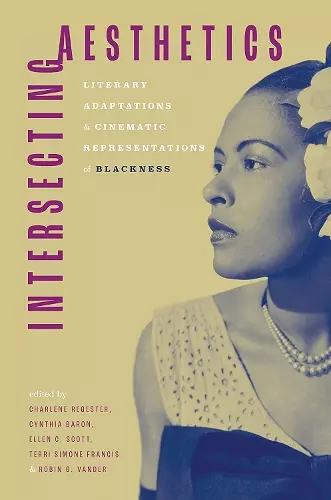Intersecting Aesthetics
Literary Adaptations and Cinematic Representations of Blackness
Robin G Vander editor Cynthia Baron editor Ellen C Scott editor Terri Simone Francis editor Charlene Regester editor
Format:Paperback
Publisher:University Press of Mississippi
Published:15th Dec '23
Should be back in stock very soon

Contributions by Cynthia Baron, Elizabeth Binggeli, Kimberly Nichele Brown, Terri Simone Francis, Priscilla Layne, Eric Pierson, Charlene Regester, Ellen C. Scott, Tanya L. Shields, and Judith E. Smith
Intersecting Aesthetics: Literary Adaptations and Cinematic Representations of Blackness illuminates cultural and material trends that shaped Black film adaptations during the twentieth century. Contributors to this collection reveal how Black literary and filmic texts are sites of negotiation between dominant and resistant perspectives. Their work ultimately explores the effects racial perspectives have on film adaptations and how race-inflected cultural norms have influenced studio and independent film depictions. Several chapters analyze how self-censorship and industry censorship affect Black writing and the adaptations of Black stories in early to mid-twentieth-century America. Using archival material, contributors demonstrate the ways commercial obstacles have led Black writers and white-dominated studios to mask Black experiences. Other chapters document instances in which Black writers and directors navigate cultural norms and material realities to realize their visions in literary works, independent films, and studio productions. Through uncovering patterns in Black film adaptations, Intersecting Aesthetics reveals themes, aesthetic strategies, and cultural dynamics that rightfully belong to accounts of film adaptation.
The volume considers travelogue and autobiography sources along with the fiction of Black authors H. G. de Lisser, Richard Wright, Ann Petry, Frank Yerby, and Walter Mosley. Contributors examine independent films The Love Wanga (1936) and The Devil’s Daughter (1939); Melvin Van Peebles's first feature, The Story of a Three Day Pass (1967); and the Senegalese film Karmen Geï (2001). They also explore studio-era films In This Our Life (1942), The Foxes of Harrow (1948), Lydia Bailey (1952), The Golden Hawk (1952), and The Saracen Blade (1954) and post-studio films The Learning Tree (1969), Shaft (1971), Lady Sings the Blues (1972), and Devil in a Blue Dress (1995).
Intersecting Aesthetics is a pivotal work from leading scholars in African American film studies. The influence of this collection will reach long into the future." - Gerald Butters, coeditor of Beyond Blaxploitation
ISBN: 9781496848857
Dimensions: unknown
Weight: 272g
277 pages